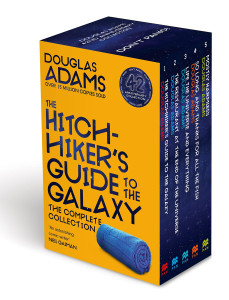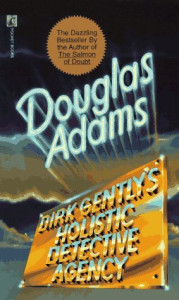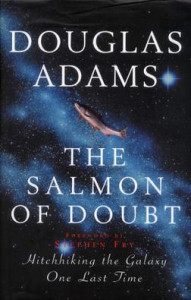 Far out in the uncharted backwaters of the unfashionable end of the Western Spiral arm of the Galaxy lies a small unregarded yellow sun. Orbiting this at a distance of roughly ninety-eight million miles is an utterly insignificant little blue-green planet whose ape-descended life forms are so amazingly primitive that they still think digital watches are a pretty neat idea.
Far out in the uncharted backwaters of the unfashionable end of the Western Spiral arm of the Galaxy lies a small unregarded yellow sun. Orbiting this at a distance of roughly ninety-eight million miles is an utterly insignificant little blue-green planet whose ape-descended life forms are so amazingly primitive that they still think digital watches are a pretty neat idea.
Thus begins The Hitchhiker’s Guide to the Galaxy (the book by Douglas Adams, as opposed to the actual Guide, which comes only in electronic form and has the comforting words “Don’t Panic” inscribed in large friendly letters on its cover). Hitchhiker, published in 1979, was based on Adams’ hugely successful BBC radio series of the same name. It is the story of perfectly ordinary Englishman Arthur Dent and his eccentric friend Ford Prefect, who rescues Arthur moments before the Earth is demolished to make way for a hyperspatial express route.
Fortunately, Ford and Arthur are able to hitch a ride on the Vogon ship that has actually been assigned to carry out the destruction of Earth. Unfortunately, they are discovered and ejected into space, where, once again fortunate, they are immediately rescued by President of the Galaxy Zaphod Beeblebrox and his girlfriend Trillian. Beeblebrox, Trillian, and their pathetically depressed robotic sidekick Marvin have stolen a ship called the Heart of Gold and are searching for the supposedly mythical planet of Magrathea.
When the group finally finds Magrathea, a planet where the main industry is building custom-made planets for the rich and where the population has been sleeping for 5 million years, they discover that the Magratheans have been awakened for a very special project. They are to figure out the Question. The Answer to life, the Universe, and everything, was provided by a computer called Deep Thought, but it was not an Answer that made any sense, and therefore a new Question is necessary.
In The Restaurant at the End of the Universe the quest for the correct Question continues. Arthur, Ford, Zaphod, Trillian and Marvin head for Milliways, the titular restaurant. Not the end in distance, mind you, but the actual End of the Universe, when it all goes up with a bang. We also meet Zaphod’s (dead) grandfather, and explore more of the Galaxy, searching for the actual person in charge of it all.
 In Life, the Universe and Everything, the gang is called upon to save the Universe from the bloodthirsty and xenophobic population of the planet Krikkit. The people of Krikkit, “a bunch of real sweet guys who just happen to want to kill everybody,” have the ultimate superweapon, and are planning to use it to destroy all life in the Universe. Arthur must prevent this from happening.
In Life, the Universe and Everything, the gang is called upon to save the Universe from the bloodthirsty and xenophobic population of the planet Krikkit. The people of Krikkit, “a bunch of real sweet guys who just happen to want to kill everybody,” have the ultimate superweapon, and are planning to use it to destroy all life in the Universe. Arthur must prevent this from happening.
But Arthur has his own problems. He’s discovered that he has been inadvertently and repeatedly killing the same entity, and the entity, Agrajag, is annoyed.
Oh yes, and Arthur discovers that God’s final message to His creation is written in thirty-foot high letters of fire on top of the Quentulus Quazgar Mountains in the land of Sevorbeupstry on the planet Preliumtarn.
Sadly, Arthur manages to forget the location of this most important of all messages.
So Long, and Thanks For All the Fish finds Arthur safely back on the Earth, and the planet seems exactly as he left it. With all of the time travel Arthur and Ford have done, Arthur is 8 years older but only 6 months appear to have passed on Earth. There are subtle differences, however; for instance, all of the dolphins have disappeared.
Arthur falls in love with a mentally disturbed woman named Fenchurch, and together they try to solve the mystery of the restored Earth, as well as the mystery of the profound cosmic message that Fenchurch feels is hidden in her subconscious mind. After a trip to California to consult with Wonko the Sane about the missing dolphins, Arthur and Fenchurch hitch a ride on a passing spaceship. They journey to the planet Preliumtarn, where they make the pilgrimage to the holy site to view God’s Final Message.
 The Whole Sort of General Mish Mash finishes up with Mostly Harmless, a title taken from the final edited entry for Earth in the Hitchhikers Guide. Arthur has become the great Sandwich Maker. The Hitchhiker’s Guide has been taken over by new management, and Ford must break into the building and hack into the corporate computers to combat the great evil that is the New and Improved Hitchhiker’s Guide to the Galaxy.
The Whole Sort of General Mish Mash finishes up with Mostly Harmless, a title taken from the final edited entry for Earth in the Hitchhikers Guide. Arthur has become the great Sandwich Maker. The Hitchhiker’s Guide has been taken over by new management, and Ford must break into the building and hack into the corporate computers to combat the great evil that is the New and Improved Hitchhiker’s Guide to the Galaxy.
By far the best two books in the series, The Hitchhiker’s Guide to the Galaxy and The Restaurant at the End of the Universe are works of silly brilliance, or perhaps brilliant silliness. The late Douglas Adams was a genius, with a knack for pointing out stupidity in all of its myriad manifestations. His Monty Pythonesque humor (indeed, he was both a fan and a friend of the Python troupe) was deliciously suited for the pointed and tart jabs he aimed at religion, politics, advertising, governmental bureaucracy, the military, and the mass of humanity as a whole. Adams had no sacred cows; everyone and everything were fair game. Adams has been compared to Swift, a social critic and commentator of magnificent skill. In addition, when he put his mind to it he was a wonderful storyteller. I love the first two books of the “trilogy.”
As the series progresses, though, the work becomes darker and slightly harder to follow. The remaining books all contain occsional flashes of utter brilliance, but less continuous enjoyment. By Mostly Harmless, which has been referred to by some as Mostly Awful, Adams’ vision is extremely dark and quite depressing. In fact, Adams had planned to write a sixth book in order to alleviate the bleak ending of Mostly Harmless. Alas, he never had the chance.
Still, all of thbooks in the series are worth reading for their wit and insight into the human condition … a condition which, if you believe Adams, sometimes resembles nothing so much as total idiocy.
While the Hitchhiker books present the standard trappings of science fiction (space travel, time travel, robots, aliens), albeit in a nonstandard way, Adams’ Dirk Gently series examines the Universe from a slightly more metaphysical viewpoint. In Dirk Gently’s Holistic Detective Agency we meet Dirk Gently, a detective (and sometime con man) who approaches his cases from a “holistic” point of view. That is to say, Gently believes that everything is interconnected and that in order to find the answer to one mystery, one may begin by finding answers to other seemingly unrelated questions, and that everything will work itself out in the end.
When a friend of Dirk’s from college becomes involved in the murder of his boss, Dirk launches an investigation that involves an Electric Monk, time travel, Samuel Taylor Coleridge, an ancient mariner, a trapped sofa, and a delightfully bored horse. Oh, it sounds bizarre, and it is, but Dirk Gently’s Holistic Detective Agency is hilariously funny and once again a perfect display of Adams’w genius. Described at his website as a “ghost/horror/detective/time travel/romantic comedy epic,” Dirk Gently is an incredibly fun book. It is worth reading just for the subplot involving converting the wave forms of nature (such as the wingbeats of birds) into music via computer.
The sequel The Long Dark Tea-Time of the Soul features Dirk Gently in yet another mystery which involves attempting to explain a sudden explosion at a ticket counter in Heathrow Airport. We meet the great Thunder God Thor, who is unhappy with a business deal that his father, Odin the All-Father, has made, which enables Odin to live happily pampered in a ritzy nursing home while nefarious characters avail themselves of his omnipotent powers.
Dirk Gently must figure out what has happened to his secretary (she vanished at the time of the explosion), who the mysterious criminals are, and what to do about the angry eagle imprisoned in his kitchen. While not as funny as Dirk Gently’s Holistic Detective Agency, Tea-Time does have some wonderful moments, and it is a thoroughly enjoyable novel.
On May 11, 2001, friends and fans of Douglas Adams were devastated when he died at the age of 49 of a sudden heart attack. There would be no more brilliantly funny work from the beloved writer; the long awaited books in the Hitchhiker and Dirk Gently series would never be written. Fortunately for fans, his friends and editors pored through the files left on his four computers and compiled what I believe to be the best of all the Adams books.
The Salmon of Doubt: Hitchhiking the Galaxy One Last Time is an amazing book. Essays, musings, thoughts, interviews, and lecture texts lead up to what many fans will consider the biggie: nine chapters of The Salmon of Doubt, which according to Adams could have become either the sixth Hitchhiker book or the third Dirk Gently novel. While I enjoyed the chapters of his final novel, the preceding essays, interviews, and lectures were far more interesting to me, because these pieces present a picture of Douglas Adams that his novels only hint at. What a joy it must have been to know the man!
A serious logician, he was capable of great silliness. Salmon contains some beautiful pieces of humor, including “Unfinished Business of the Century” and “Frank the Vandal.” There are lovely pieces on our endangered wildlife (Adams was devoted to saving endangered species). I particularly love both his explanation of why he is an atheist and his later explanation of why it’s OK to have a god (though he believed that we created gods, and not the other way around).
Even if you are not a particular fan of Douglas Adams, I highly encourage you to read The Salmon of Doubt. Douglas Adams was a smart, funny, wise man and this is a smart, funny, and wise book. This book demonstrates perfectly how Adams saw the world and how he was able to share his views with his readers so convincingly through logic, wit, and above all, humor. I would not have missed this book. Indeed, for all their flaws, I would not have missed any of Douglas Adams’ works.
Please see our own Rowan Inish’s wonderful review of Last Chance to See, the amazing book that Douglas Adams felt was his very best work.
(Harmony Books, 1979)
(Harmony Books, 1980)
(Harmony Books, 1982)
(Harmony Books, 1984)
(Harmony Books, 1992)
(Simon and Schuster, 1987)
(Simon and Schuster, 1988)
(Harmony Books, 2002)
